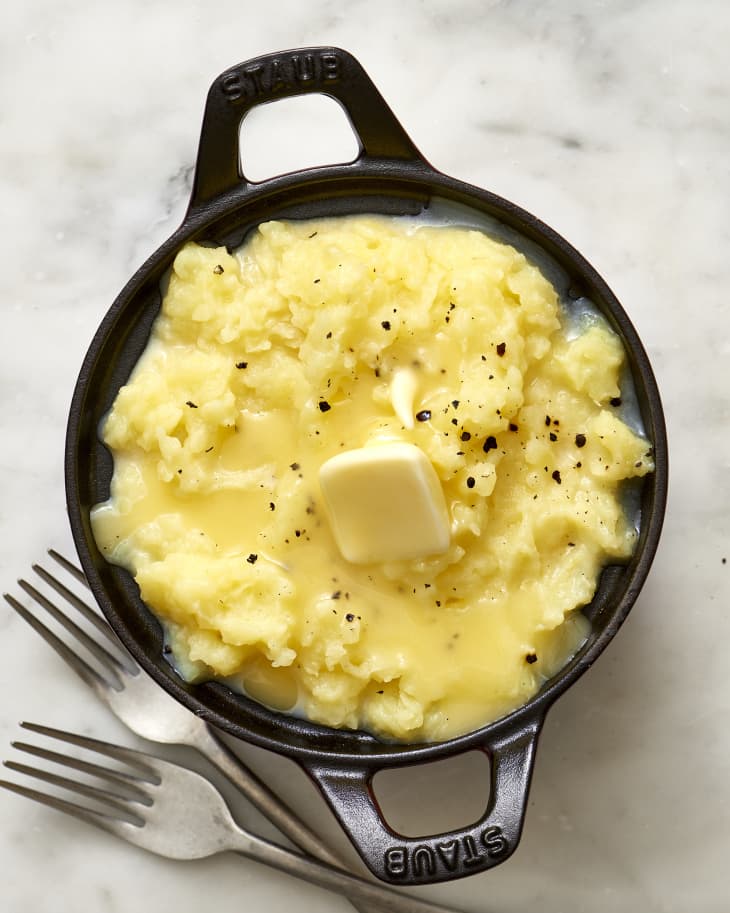How to Fix Ruined Mashed Potatoes
For a dish as simple as mashed potatoes, there are a lot of ways to potentially mess up a batch. It can seem like a disaster when your mashed potatoes turn out lumpy, watery, too salty, or even gluey — especially if you’re making them for Thanksgiving or another special meal.
But don’t worry, there’s almost always a way to solve your tater troubles. Here’s what to do if your mashed potatoes are less than perfect, with easy fixes to bring them back from the brink.
How to Fix Runny Mashed Potatoes
Soupy, watery mashed potatoes usually happen because the cooked potatoes were cut into pieces that were too small, weren’t drained well enough, or were overcooked.
Fix them: Scoop the watery mashed potatoes into a pan and stir constantly over low heat to evaporate the excess liquid. If the potatoes are really watery, you can add either cornstarch or instant mashed potatoes a half teaspoon at a time to help the spuds thicken to your preferred consistency.
Next time: While cutting potatoes into smaller pieces will help them cook more quickly, it can also cause the pieces to absorb too much water, so resist the urge when prepping potatoes. Set a timer to check the potatoes and make sure they don’t overcook, and drain them very well before mashing.
How to Fix Lumpy Mashed Potatoes
Did you add the potatoes to already boiling water instead of bringing the potatoes and water to a boil together? Doing this can cause uneven cooking, and when your potatoes aren’t cooked evenly — that is, when the inside of each piece is undercooked while the edges are soft and tender — you end up with lumpy mashed potatoes.
Fix them: Scoop the lumpy potatoes into a pan and add a splash of dairy — cream, half-and-half, milk, or sour cream. Cook over low heat, stirring and mashing until smooth. You may need to add a bit more dairy as you go to smooth out those lumps. (If you don’t want to use dairy, you can use veggie or chicken broth or a non-dairy milk, such as rice milk, to help smooth out the lumps, but be aware that these might affect the flavor of your mashed potatoes. )
Next time: Cover the potatoes with cold water in your pot and bring them to a boil over medium-high heat. It’s the best way to make sure the potatoes cook evenly.
How to Fix Salty Mashed Potatoes
Salting the water you’re cooking the potatoes in is generally a good thing, because it helps season the potatoes as they cook. But if you’re using salted butter or just going heavy-handed on the salt as you’re mashing, it can be too much of a good thing.
Fix them: To tone down the salt, add more dairy, like cream or unsalted butter, to compensate and soak up some of the saltiness. If you have cauliflower rice on hand, you can quickly microwave it and stir in the soft, bland bits to offset the salt as well.
Next time: Use unsalted butter in your potatoes and taste as you go.
How to Fix Gluey Mashed Potatoes
You thought it would be quicker to mash your potatoes in the food processor or blender, but you ended up with wallpaper paste instead of a fluffy purée. That’s because the aggressive motion of the blade caused all the cell walls in the potatoes to explode, releasing the starch and literally gumming up the works.
Fix it: This is the toughest potato issue to fix, because there’s really no going back from a gluey potato. The best thing you can do is to create a distraction with lots of cheese. Stir shredded cheese into the potatoes and transfer to a baking dish, topping with more cheese and a crunchy element like panko breadcrumbs or crushed crackers. Bake until the gratin is puffy and golden-brown on top.
Next time: Go gentle and mash your potatoes by hand with a food mill, a ricer, or a handheld masher. This keeps the starchy cells of the potato intact and gives you the perfect fluffy texture.
